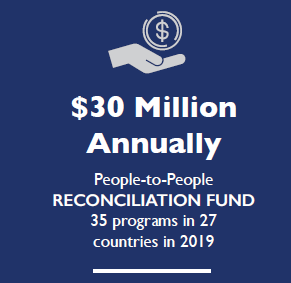- What We Do
- Agriculture and Food Security
- Democracy, Human Rights and Governance
- Economic Growth and Trade
- Education
- Environment and Global Climate Change
- Gender Equality and Women's Empowerment
- Global Health
- Humanitarian Assistance
- Transformation at USAID
- Water and Sanitation
- Working in Crises and Conflict
- U.S. Global Development Lab
Speeches Shim
Conflict not only takes human lives, destroys communities and erodes development gains, but also leaves a legacy of fear, hostility, and trauma. Without effective, inclusive peace and reconciliation processes, countries are likely to revert back to violence.
Through cutting edge research, training and field support, USAID analyzes conflict dynamics and invests in peacebuilding and reconciliation to build stability and public security in conflict-affected areas.
USAID seeks to strengthen moderate voices and rebuild ties between divided communities. For example:
- USAID supports peacebuilding through “people-to-people” reconciliation programs and activities which bring together individuals of different ethnic, religious or political backgrounds from areas of civil conflict and war. These programs provide opportunities for adversaries to address issues, reconcile differences, promote greater understanding and mutual trust and work on common goals with regard to potential, ongoing, or recent conflict.
- USAID trains development professionals in the skills necessary to integrate a peacebuilding approach into conflict-affected environments. Due to the unique nature of every conflict, reconciliation programs must be contextually designed based on the country’s circumstances.
- USAID aims to mainstream conflict sensitive programming into our development assistance portfolio across sectors, including economic growth, democracy and governance, education, and health. Activities are designed to maximize impact on development assistance, and leverage field mission investments.
To date, USAID has:
- Supported nearly 330 peacebuilding projects in 42 countries.
- Awarded more than $230 million in grants for “people-to-people” reconciliation programs and activities.
USAID works with local partners and field missions to address the legacy of violence through activities such as support to local and regional peace processes, restorative justice programs, ethnic dialogue, interfaith peace building, inclusive and legitimate governance structures and grassroots reconciliation.

People-to-People Reconciliation Fund: These programs contribute to a country’s journey to self-reliance by healing the social divisions on which autocratic and authoritarian governments thrive. Communities reconciling differences and working together on shared interests are more likely to effectively lobby government, establish civil society organizations, improve their own capacity to manage conflict, and demand commitment, accountability, and transparency. Reconciled communities are also more likely to be inclusive, resilient to external threats, respect human rights, and monitor public service delivery, thus supporting a return to positive norms and standards.

Comment
Make a general inquiry or suggest an improvement.